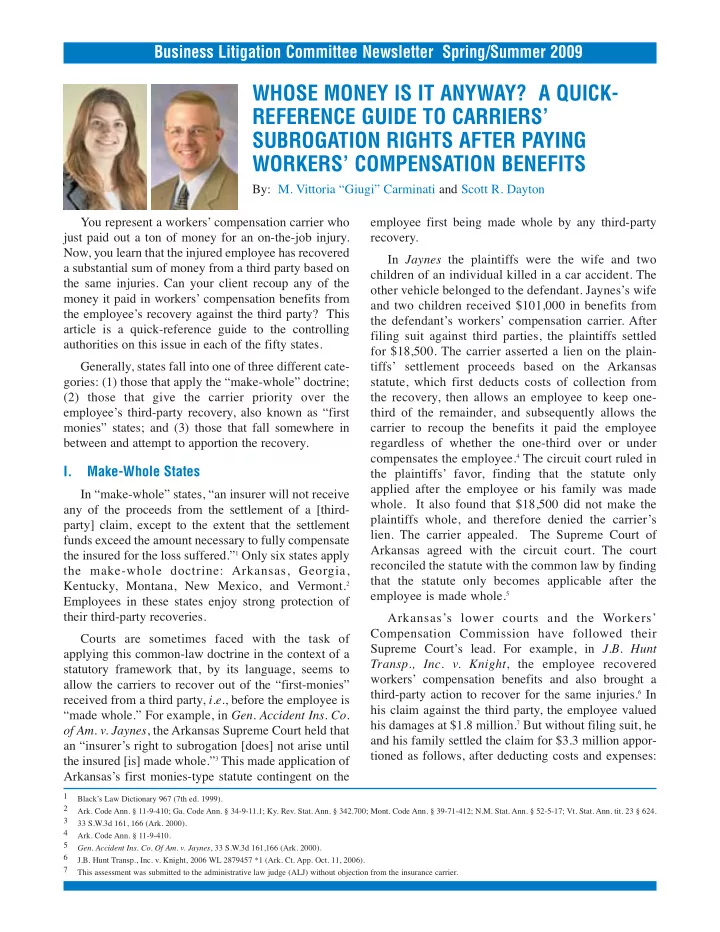

Business Litigation Committee Newsletter Spring/Summer 2009 WHOSE MONEY IS IT ANYWAY? A QUICK- REFERENCE GUIDE TO CARRIERS’ SUBROGATION RIGHTS AFTER PAYING WORKERS’ COMPENSATION BENEFITS By: M. Vittoria “Giugi” Carminati and Scott R. Dayton You represent a workers’ compensation carrier who employee first being made whole by any third-party just paid out a ton of money for an on-the-job injury. recovery. Now, you learn that the injured employee has recovered In Jaynes the plaintiffs were the wife and two a substantial sum of money from a third party based on children of an individual killed in a car accident. The the same injuries. Can your client recoup any of the other vehicle belonged to the defendant. Jaynes’s wife money it paid in workers’ compensation benefits from and two children received $101,000 in benefits from the employee’s recovery against the third party? This the defendant’s workers’ compensation carrier. After article is a quick-reference guide to the controlling filing suit against third parties, the plaintiffs settled authorities on this issue in each of the fifty states. for $18,500. The carrier asserted a lien on the plain- Generally, states fall into one of three different cate- tiffs’ settlement proceeds based on the Arkansas gories: (1) those that apply the “make-whole” doctrine; statute, which first deducts costs of collection from (2) those that give the carrier priority over the the recovery, then allows an employee to keep one- employee’s third-party recovery, also known as “first third of the remainder, and subsequently allows the monies” states; and (3) those that fall somewhere in carrier to recoup the benefits it paid the employee between and attempt to apportion the recovery. regardless of whether the one-third over or under compensates the employee. 4 The circuit court ruled in I. Make-Whole States the plaintiffs’ favor, finding that the statute only applied after the employee or his family was made In “make-whole” states, “an insurer will not receive whole. It also found that $18,500 did not make the any of the proceeds from the settlement of a [third- plaintiffs whole, and therefore denied the carrier’s party] claim, except to the extent that the settlement lien. The carrier appealed. The Supreme Court of funds exceed the amount necessary to fully compensate the insured for the loss suffered.” 1 Only six states apply Arkansas agreed with the circuit court. The court reconciled the statute with the common law by finding the make-whole doctrine: Arkansas, Georgia, that the statute only becomes applicable after the Kentucky, Montana, New Mexico, and Vermont. 2 employee is made whole. 5 Employees in these states enjoy strong protection of their third-party recoveries. Arkansas’s lower courts and the Workers’ Compensation Commission have followed their Courts are sometimes faced with the task of Supreme Court’s lead. For example, in J.B. Hunt applying this common-law doctrine in the context of a Transp., Inc. v. Knight , the employee recovered statutory framework that, by its language, seems to workers’ compensation benefits and also brought a allow the carriers to recover out of the “first-monies” third-party action to recover for the same injuries. 6 In received from a third party, i.e. , before the employee is his claim against the third party, the employee valued “made whole.” For example, in Gen. Accident Ins. Co. his damages at $1.8 million. 7 But without filing suit, he of Am. v. Jaynes , the Arkansas Supreme Court held that and his family settled the claim for $3.3 million appor- an “insurer’s right to subrogation [does] not arise until tioned as follows, after deducting costs and expenses: the insured [is] made whole.” 3 This made application of Continued on page 13 Arkansas’s first monies-type statute contingent on the 1 Black’s Law Dictionary 967 (7th ed. 1999). 2 Ark. Code Ann. § 11-9-410; Ga. Code Ann. § 34-9-11.1; Ky. Rev. Stat. Ann. § 342.700; Mont. Code Ann. § 39-71-412; N.M. Stat. Ann. § 52-5-17; Vt. Stat. Ann. tit. 23 § 624. 3 33 S.W.3d 161, 166 (Ark. 2000). 4 Ark. Code Ann. § 11-9-410. 5 Gen. Accident Ins. Co. Of Am. v. Jaynes , 33 S.W.3d 161,166 (Ark. 2000) . 6 J.B. Hunt Transp., Inc. v. Knight, 2006 WL 2879457 *1 (Ark. Ct. App. Oct. 11, 2006). 7 This assessment was submitted to the administrative law judge (ALJ) without objection from the insurance carrier. 6
Recommend
More recommend